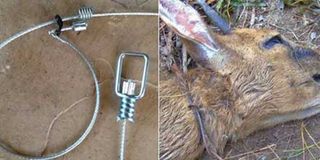Snares kill more wildlife, 6.2 tonnes of wires seized

What you need to know:
A senior official of the Tanzania National Parks (Tanapa) says snares kill more wild animals in the Serengeti as many poachers in the western rim of the vast park are bush meat hunters.
He revealed this as it emerged more than six tonnes of snares are impounded under the Serengeti De-snaring programme being executed by the Frankfurt Zoological Society (FZS) in collaboration with other partners
Arusha. Snares kill more wild animals around the Serengeti National Park than bullets because most of the poachers are traditionally bush meat hunters.
Although the most snared species are the grazing animals; antelopes, zebras, wildebeests and buffaloes, the killings have not spared the elephants, the cat family members and rhinos for their trophies.
"We know how snares can kill thousands of animals", said Martin Loibooki, the director of conservation with the Tanzania National Parks (Tanapa) when speaking to the stakeholders in the industry.
He lauded an initiative taken by the Frankfurt Zoological Society (FZS) to fight the menace through the recently-launched Serengeti De-Snaring Programme through which a total of 17,536 snares have been seized.
The programme is a collaborative effort by FZS and Tanapa through the Serengeti National Park, the Tanzania Association of Tour Operators (Tato) and investors in Serengeti to fight poaching through de-snaring.
Mr Loibooki added during a gathering convened to take stock of the effort that the initiative would be replicated to other national parks "if it proves succcessful in our anti-poaching fight".
The de-snaring programme, launched in April last year, is one of the measures taken to support the park authorities contain the escalating killings of animals around the country's oldest and famous park through snares.
According to the project manager Erik Winberg (Serengeti De-Snaring Programme) about 6.2 tonnes of snares - mostly loops the wires - had been confiscated since the campaign started 16 months ago.
"These are enough for recycling business", he said, noting that the exercise has seen 32 poachers caught, 125 poachers' camps found and destroyed, mostly in the western part of the park.
A brief presented to the meeting of wildlife/tourism stakeholders at an Arusha hotel indicated that at least 157 animals were rescued alive and 530 found trapped to death through snares.
Local investors - majority being the tour and lodge operators in the Serengeti - have ever since raised about $ 160,000 to support the programme.
The money was used to purchase vehicles and other equipment and to support two teams - of eight people each - currently working to remove snares in and around the protected area.
Mr.Winberg added that on average 35 snares are collected a day in the vast Serengeti National Park and that $ 5,000 is needed to cover the cost of running one of the snaring teams for a month.
The programme's target is to collect between $ 10,000 and 15,000 a month from investors operating in Serengeti and other stakeholders.




